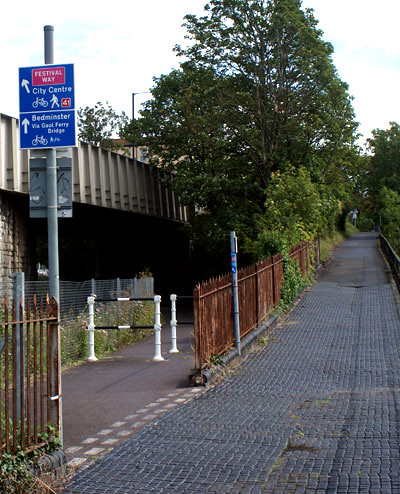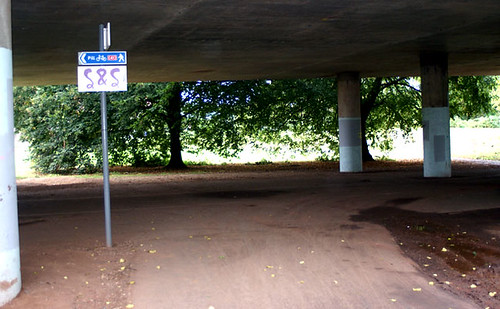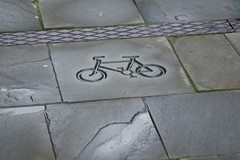I have been provoked into this. A Bristolian cyclist (@sprinstar)
tweeted this morning to ask if Bristol should be rated in the Copenhagenizelist of top cycling cities. A simple answer is that Bristol is too small
a city to be considered for that list anyway. But the spirit of what @sprinstar
wrote is what matters. It was strong provocation.
Adding the mournful typogram :( - he
concluded "sometimes I think Bristol is going backwards" and all my Bristol
cycling anxiety bubbled up. "Why", I thought "does cycling around
Bristol bring out such ambivalent feelings in me?". I have only just got
here and hardly know my way round at all. But after only 3 months, for every
positive feeling about how good it is for cycling, there's a really negative
experience that puts me right back into feelings of sullen frustration and
annoyance.
So, all the positives accepted and noted, let me set out the
experiences that stop Bristol being the great cycling city that it is in my
dreams.
1) Signage is maddeningly inconsistent and
unreliable. This is a blog in itself. Several different bodies are involved
here and so there is no obvious target to blame. Looking at every kind of sign,
from road and path surface marking, through finger signs, street name signs,
direction indicators, confirmation way markers, route number markings, to official
mandatory, advisory, permissive and advanced warning indicators: all suffer from
degrees of neglect, absence, poor visibility, ambiguity, poor placement and
redundancy. Basically, a mess. Some is beautifully clear and prominent – encouraging
enthusiasm and adventurous exploration.
And then, gaps and vagueness appear at crucial junctions and the adventurer gets
lost. Some is mystifying, some has been clearly vandalised, some is just
perverse. Some is just not there.
Someone has removed the sign that
explains whatever lies to the right of this sign. Only those who already know where they are going are happy. (some more signs can be seen on my flickr site here and here)
2) Official maps are encouraging but not always very helpful. Bristol
City Council has a set of cheerful and detailed leaflets showing a range of cycle routes and
amenities across and around the city. They look appealing and they are sent
out, or can be downloaded, free of charge. In practice they either lack required
detail or else pack things so tightly together that using them on the road demands
too much intuition and guesswork (maybe I'm just a poor map reader?). With poor signage, ambiguous or
difficult-to-read maps are even more frustrating.
3) Physical provision is fragmented. Nothing about
cycling in Bristol is free-flowing. The longest uninterrupted sections of
cycling are on shared pedestrian/cycle paths – very definitely a second-best
option in my book. Shared paths are only trouble-free when no one else is using
them. For pedestrians they can make relaxation impossible. For a cyclist they
reduce the normal rhythm of a cycle journey to a forced and frequently
interrupted meander. Short sections of contra
flow cycle lane in one way streets (eg Nelson Street) and fragments
of cycle lane alongside loading/parking
places (Gloucester Road, I think) are just plain dangerous. Some unexpected bits
of cycle lane within multi-lane roads, ahead of roundabouts, near the city centre demand
almost suicidal courage to use at all.
4) Cycling culture in Bristol is, broadly speaking, anarchic.
I don't see any overt antagonism from motorists or pedestrians, but as a
pedestrian (I walk a lot) I am regularly disturbed and sometimes shocked by
cyclists in unexpected (non-legal) places. Perhaps the poor signage is to blame. But even
where NO CYCLING is clearly painted in large letters across a footpath on the Downs,
plenty of cyclists pay no attention. Footpaths have become a de facto set of optional
cycle paths for a lot of Bristol cyclists. Many open areas in the centre of Bristol
are marked on the maps as "shared" or "pedestrian". Presumably
most people have never seen the maps, because they are all treated as
"shared" by very many cyclists. One of my early shocks in Bristol was
seeing this scary looking video:
A cycling campaigner is demonstrating the "Brunel Mile" in which a
footpath across Queen Square is used (see from 0.34) instead of the
"proper" cycle route on the south side of the square that is marked on the ground by rather elegant paving
slabs.
5) Everything defers to the motor car. Obviously,
this is not Bristol City Council Official Policy but it might just as well be. As
long as so much of all our lives is taken up by ownership and use of the car,
everything else that wants to move is going to have to wait. Parked cars line
most of Bristol's smaller roads, and even where parking is not allowed, parked or
waiting vehicles create hazards for cyclists at regular intervals. The narrow cycle
lanes that have been painted (almost never constructed) alongside roads are
normally blocked at intervals along the route by a stationary car or other
vehicle. Cracks and potholes are numerous.
What we need to do, I think, is
think before demanding the impossible or the contentious, and make more
efforts to maintain and mend the things we already have. It's good. It could and
should be better. I have a feeling that if cyclists keep on asking for more, the
negative aspects of what we already have will put a real drag on progress. The
high level of consideration afforded cyclists by other road users (especially the
hard-pressed pedestrians) in Bristol will evaporate if we can't be more confident
and considerate as cyclists.



No comments:
Post a Comment